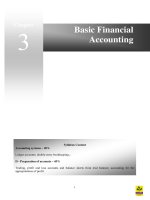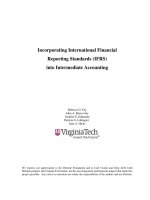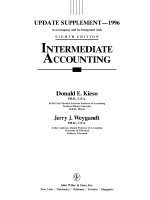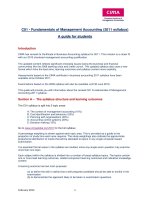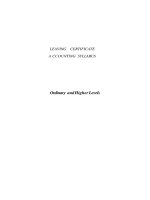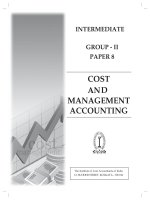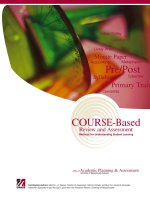Intermediate acctg syllabus
Bạn đang xem bản rút gọn của tài liệu. Xem và tải ngay bản đầy đủ của tài liệu tại đây (186.08 KB, 5 trang )
MGMT S-1100 (CRN 33338)
Intermediate Accounting
Summer 2021
Professor Vijay Sampath
Section Meeting Time: Monday, Wednesday 3:15 – 6:15 pm
Telephone: (646) 479-7517
Web Conference
Email:
Prerequisites: ECON S-1900 or equivalent
Course Objectives
This course builds on the fundamentals of financial accounting and reporting that you learned in
the introductory Financial Accounting course (ECON S-1000 or equivalent). By the end of the
course, you should have a good understanding of the (a) preparation and interpretation of an
entity’s financial statements in accordance with generally accepted accounting principles, (b)
accounting for complex business transactions, and (c) techniques to evaluate firm performance.
Topics include income statement, individual components of assets and liabilities, stockholders’
equity, statement of cash flows, revenue recognition and accounting changes. Real-life case
studies will be used to evaluate firm performance.
Required Textbook: Intermediate Accounting by Spiceland, Nelson and Thomas. McGraw-Hill
Irwin Tenth Edition (ISBN13: 9781260310177; ISBN 10: 1260310175)
An access code for McGraw Hill comes automatically with the purchase of a new text. The
access code is as follows: Supplementary cases, notes, solutions to in-class exercises and other
handouts will be given posted on Canvas.
Grading
1
Letter grades will be assigned for the course based on the following scale:
96-100%
91-95
86-90
80-85
75-79
70-74
60-69
59 or less
A
AB+
B
BC+
C
F
Grading will be weighted as follows (for graduate students):
Homework Assignments
Case studies
Midterm Exam
Final Exam
Individual Paper
25%
20%
20%
25%
10%
Homework Assignments
The website for the assignments will be provided on the first day of class. You must log
in and register as a student user. This is the website from which homework assignments
are completed.
All homework assignments must be submitted electronically. McGraw Hill will grade the
problems for correctness; multiple attempts per question are permitted.
The questions assigned are contained in the Course Calendar below. For some of the
questions, the numbers will be generated algorithmically, so the numbers WILL NOT be
the same as those in your text or of other students.
Each assignment is worth the same percentage of the overall assignment grade weight,
and the problems are equally weighted. The score from McGraw Hill will be converted
into a percentage grade. Your best score from the (multiple) assignments will be
considered for grading purposes.
You can work together on your homework assignments; however, each student must
submit his/her own answer.
Case studies – group project
The class will be divided into groups of two to three students and cases will be assigned. There
will be two cases assigned to each team: Dell and Apple. The case studies have been uploaded in
Canvas under Files Case Studies. For both cases, the team members are jointly required to
answer the questions that will be provided with the case. The answers are due prior to the date
assigned to discuss the case. Each team will email me two Word/Pdf documents, one for each
case. You are not required to prepare any PPT presentations.
2
Exams
There will be two exams – a midterm and a final exam. Both exams will be administered
electronically through the McGraw Hill website. The final exam will be held on Wednesday,
August 4th.
Individual Paper
You have to write a paper performing an analysis of the latest annual financial statements of a
public company, which you will choose with my approval. The purpose of my approval is to
make sure that multiple students do not work on the same company. The paper should be 3-5
pages (double-spaced and Times Roman 12 font) in length (not including appendices) and is due
on 8/4/2021; please email your papers to me. You will be required to present your findings
during class on 8/2/2021 (5 minutes, 2-5 slides). Note: As we go through each chapter in class,
you can build your paper based on what you learnt in class.
Attendance and Class Participation
Attendance in class is required. Summer School policy requires attendance in all classes. Missing
three or more classes will result in 5% loss of grade. The course and students also benefit from
active participation. Students are expected to contribute throughout the course. While there is no
formal assessment of participation, students on the borderline between two grades will get the
“benefit of the doubt” if they have actively participated. Here is a link to the Summer School
policies around Student Responsibilities. ( />Academic Integrity Policy for this course
You are responsible for understanding Harvard Summer School policies on academic integrity
and how to use sources responsibly. Not knowing the rules, misunderstanding the rules, running
out of time, submitting the wrong draft, or being overwhelmed with multiple demands are not
acceptable excuses. To support your learning about academic citation rules, please visit the
Resources to Support Academic Integrity ( where you will find links to the Harvard Guide to
Using Sources and two free online 15-minute tutorials to test your knowledge of academic
citation policy. The tutorials are anonymous open-learning tools.
Accessibility Issues
The Summer School is committed to providing an accessible academic community. The
Accessibility Office offers a variety of accommodations and services to students with
documented disabilities. Please visit for more information.
3
Tentative Class Schedule
(BE: Brief Exercises; E: Exercises)
DATE
TOPIC
HOMEWORK ASSIGNMENTS
6/21/2021
Chapter 01: Introduction
Chapter 02: Accounting Process
Chapter 03: Balance Sheet
Chapter 04: The Income Statement
Statement of Cash Flows
Chapter 07: Cash and Receivables
No assignment due
6/23/2021
6/28/2021
6/30/2021
Chapter 08: Inventories:
Measurement
7/05/2021
Assignment 1
BE: 1-3, 1-5, 2-4, 2-5, 2-6
E: 1-6, 1-9, 2-4, 2-6, 2-17
Assignment 2
BE: 3-2, 3-5, 4-1, 4-2
E: 3-2, 3-7, 3-9, 4-2
Assignment 3
BE: 7-3, 7-6, 7-7
E: 7-21
NO CLASS
7/07/2021
Chapter 10: Plant, Property and
Equipment
7/12/2021
Midterm Exam (Chapters 1-4, 7-8)
7/14/2021
Chapter 11: Depreciation,
Impairments, and Depletion
7/19/2021
Chapter 12: Investments
7/21/2021
Chapter 13: Current Liabilities and
Contingencies
7/26/2021
Chapter 14: Bonds and Long-Term
Debt
7/28/2021
Chapter 18: Shareholders’ Equity
Chapter 19: Share-Based
Compensation and Earnings Per
Share
Case study group discussion
Final exam preparation
8/02/2021
8/04/2021
Assignment 4
BE: 8-4, 8-5
E: 8-8, 8-13
No assignment due
Assignment 5
BE: 10-1, 10-2
E: 10-5, 10-6, 10-8
Assignment 6
BE: 11-2, 11-7, 11-11
E: 11-1, 11-3
Assignment 7
BE: 12-1, 12-2, 12-6
E: 12-2, 12-7, 12-9
Assignment 8
BE: 13-4, 13-6
E: 13-5, 13-7
Assignment 9
BE: 14-4, 14-6
E: 14-5, 14-7
Assignment 10
BE: 18-8, 18-11, 19-10, 19-13
E: 18-3, 18-15, 19-11, 19-18
Final Exam (chapters 10-14, 18, 19)
4
Based on my experience, I would suggest that spending 8-12 hours every week should allow you
to do well in this course. Those hours do not include the six hours of class time but includes the
time needed for doing the assigned homework.
In addition to asking questions about the materials covered in class, I encourage you to reach out
to me with other academic issues such as writing recommendations or advice regarding career
options and/or graduate work. I wish you all the best and look forward to a productive and fun
semester!
Prof. Vijay Sampath
5
